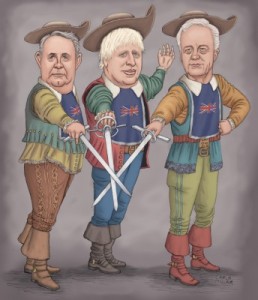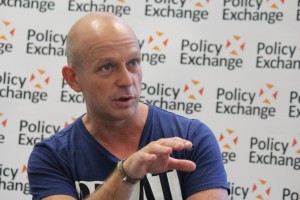Brexit: Davis says Britain will scrap EU ‘Charter of Fundamental Rights’…


- Brexit Secretary accused of ‘power grab’ over EU law – The Times (£)
- Ministers and businesses line up against ‘bonfire’ of rules – FT
- Top judge warns that Government may get dragged back to the Supreme Court – The Independent
Opposition:
- Remainers plan ‘legislative warfare’ and fresh legal challenge to Repeal Bill – Daily Mail
- May faces battle with Remoaners over fate of EU legislation – The Sun
- Sturgeon threatens to block Bill if powers aren’t devolved – Daily Telegraph
Law:
- Legal battles will rise after ‘copy and paste’ of statutes – The Times (£)
- European Court of Justice rulings will still carry weight – FT
Analysis:
- The Repeal Bill white paper is not bad, but flimsy – David Allen Green, FT
Editorial:
>Yesterday:
…as Fox ‘seething’ at exclusion from inner circle
“Liam Fox has been locked out of Theresa May’s inner circle on Brexit negotiations, No10 announced last night. The International Trade Secretary has not been asked to join the PM’s new Cabinet committee on how to carry out the high stakes ‘Article 50’ exit talks over the next two years. Dr Fox was said by one Whitehall insider to be “seething” about the decision last night.The prominent Leave campaigner is the only one of the Three Brexiteer Cabinet ministers with specific EU exit-related jobs to be excluded.The PM will chair meetings of the ultra-tight group of five, officially known as the EU Exit and Trade (Negotiations) sub-committee.” – The Sun
- May celebrated Article 50 by dining with Johnson – The Times (£)
- Prime Minister writes in EU newspapers – The Sun
- Britain calms nerves over security cooperation – The Guardian
Europe:
- Hollande backs Merkel’s snub to trade talks – The Times (£)
- EU blasted for failing to deal with worsening migrant crisis – Daily Express
Analysis:
- Wishful thinking won’t deliver the deal there is to be done – Tim Harford, FT
- If May pays the EU £50bn, the backlash will drown out the deal – Asa Bennett, Daily Telegraph
- Tough EU line undermined by ‘neighbourliness’ rule – Patrick Christys, Daily Express
- London will remain Europe’s financial capital despite Brexit – Nils Pratley, The Guardian
>Today:
>Yesterday:
…and Soubry says to ‘get on’ with setting up a new party


- UK customs risks being swamped by Brexit surge – FT
- Former senior UK diplomat to EU takes lobbying role – The Guardian
- Adams urges Irish government to publish ‘negotiating position’ – Belfast Telegraph
- Argentina tries to use Brexit to threaten Falklands – Daily Express
Comment:
- May offers a lifeline to we Remainers who forgot how ordinary people live – Tina Stowell, Daily Telegraph
Julian Jessop: The ‘Great Repeal Bill’ won’t repeal anything without sunset clauses
“In this case, British laws based on EU directives could simply cease to apply after, say, five or ten years, unless they are specifically reaffirmed through the UK legislative process. This would put the burden of proof firmly on the shoulders of those who wish to retain regulation. It would allow parliament to debate and change legislation later if desired, addressing the concerns about sovereignty. And it should still provide the reassurance to households and business that worthwhile regulations will be maintained.” – Daily Telegraph
- Now is not the time to cut the number of MPs – Tom Harris, Daily Telegraph
- Six ways Britain leaving the EU will affect you – John Rentoul, The Independent
Sketch:
- MPs set to work… but what was Clegg whispering about? – Quentin Letts, Daily Mail
- Watch out Davis, or the backbench Brexiteers will get you – Michael Deacon, Daily Telegraph
Ministers 1) Tech companies agree to get tougher on terror after Rudd summit


- The Home Secretary’s tough talk to tech firms is a PR win for both – Alex Hern, The Guardian
- Israel can teach us how to counter the new terrorism – Will Quince, Times Red Box
Ministers 2) Greening insists that new grammars will help bright, poorer children catch up
“A wave of new grammars will help stop bright poor children going on to earn less than dimmer wealthier classmates, Justine Greening said yesterday. The Education Secretary added that more selective schools could transform the lives of deprived pupils by giving them the same access to academic excellence. In a speech on social mobility, she spoke of the unfairness that clever deprived students are around a third less likely to earn a high wage than less intelligent richer peers. Ministers plan to overturn a ban on opening grammars imposed by Labour in 1998.” – Daily Mail
- Pupils from wealthy homes tend to earn more – FT
More education:
- SATs for seven-year-olds to be scrapped after u-turn by ministers – Daily Mail
>Yesterday: Local Government: Restoring order to the classroom
Ministers 3) Grayling has ‘absolute confidence’ in HS2 as project ‘plunges into chaos’


Ministers 4) Truss launches review of new car insurance rules
“A major review was launched yesterday into a controversial personal injury compensation scheme after anger that it is penalising millions of drivers. Liz Truss unveiled an urgent consultation following a backlash over a new formula for calculating payouts for victims that added up £300 to the premiums of older drivers. Despite insisting she will not reverse the shake-up in the short-term, the Justice Secretary unveiled a wide-ranging review of the rate for deciding cash claims in future. She suggested the current system was ‘not fit for purpose’.” – Daily Mail
>Yesterday: Profile: Elizabeth Truss, who does not quite know how to talk to the judges, and vice-versa
Sturgeon formally requests a second referendum


- A permanent cacophony of grievance from the SNP – Brian Wilson, The Scotsman
Philip Collins: May needs to distribute power around the country
“It is no wonder that regional inequality in Britain is vastly greater than it is in any other European nation. All the big decisions in politics, economics, law and the media are made in one place. A poorly located city in the country’s southeast corner is the entry point for most visitors. When Disraeli was extolling the virtues of Manchester, the economic powerhouse was in the north and the political powerhouse was in the south. Theresa May has been accused of wanting to turn the clock back to the Fifties. As long as she means the 1850s there is nothing wrong with that.” – The Times (£)
News in Brief:
- Armed Forces face £10bn shortfall after costs soar – The Times (£)
- NHS plans weekend GPs for everyone by 2019 – Daily Mail
- Trump’s fired national security adviser seeks immunity to testify – Daily Telegraph
- Ofcom to introduce price controls on fibre products – FT
- Low-income worker priced out of property market in most of England – The Sun
- Anti-Semitism allegations putting almost a third of voters off Labour – The Independent
- Dozens of alleged hacking victims join action against Sun publisher – The Guardian
- Royal Marines may be sacrificed to keep struggling Navy afloat – The Times (£)







